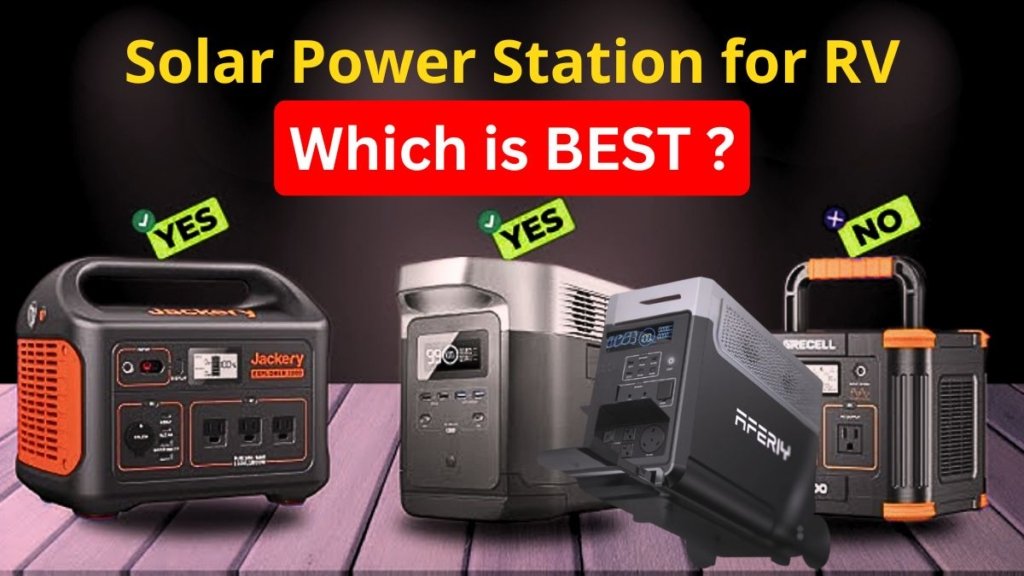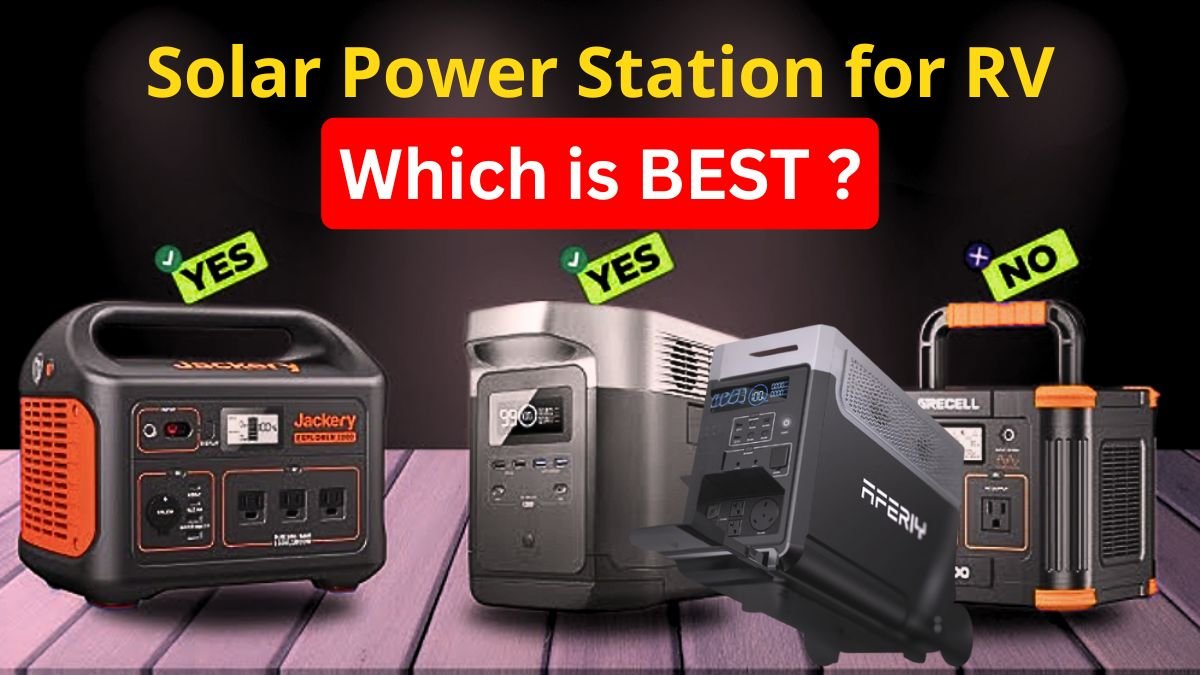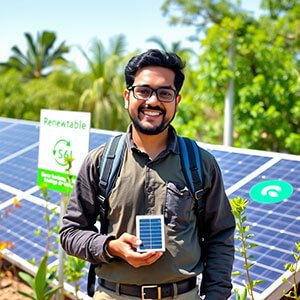Ever been deep in the perfect boondocking spot, miles from anywhere, only to have your lights flicker and die? I have, and it’s a frustrating experience that cuts a great trip short.
“Two (02) years ago, we went on a trip to the green sanctuary (office tour) using a conventional gas generator, but the generator was making so much noise that it made our solitary trip in the peace of nature quite boring.”
So, to enjoy nature and its beauty without noise and avoid noise pollution, a reliable solar power station for RV is a great gadget to choose.
If you choose the wrong solar power station, you may face some problems like insufficient power, slow charging time, etc. So after countless hours of research and hands-on use during my own RV trips since the past year: I have learned what really matters, and I am here to teach you.
This guide is designed to walk you through everything you need to know, from understanding your power needs to picking a model that will reliably run everything from your fridge to your Starlink.
Why Do You Need a Solar Power Station for Your RV?
Let’s be honest, the old ways of powering an RV are becoming obsolete. Traditional gas generators are noisy, require you to haul flammable fuel, and aren’t exactly friendly to the environment. A solar power station ( Green Energy Generator) offers some transformative upgrades.
- Silent, Peaceful moment: you can enjoy the sounds of nature, not the drone of an engine. This was a game-changer for me in my last summer tour. Because it allows for peaceful mornings and neighbor-friendly camping.
- Eco-Friendly and Fuel-Free: What else is needed if there is a new revolution in travel, such as the convenience of electricity using the power of the sun? The station I use recently is not only more economical than a gas-powered generator, but I can also worryless about toxic fumes at the campsite.
- Low Maintenance: With no moving engine parts, there are no oil changes or spark plugs to worry about. Just keep the solar panels clean.
“During my three (03) month cross-country trip last January, I relied on a Bluetti solar station to power my fridge, lights, and Starlink router in remote areas without hookups. It was quiet, lightweight, and never ran out of juice — even when I parked under partial shade.”
Key Features You Should Check for in an RV Solar Power Station before buying
Let me know in the comments if you find the technical specifications difficult to understand. But first, know what really matters to an RVer.

Battery Capacity (Wh): How do I check how much power I need
Battery capacity, measured in Watt-hours (Wh), is the single most important factor. It dictates how long you can run your appliances. Overestimating is better than underestimating – running out of power mid-trip is no fun.
- Weekend Warriors (500Wh – 1000Wh): I bought this from Amazon for a short trip last October to keep my other gadgets running, including my phone, laptop, lights, and portable fridge. Since I travel most of the time on week-long trips, this little station is perfect for me!
- Serious Boondockers (1500Wh – 3000Wh): This range is perfect for many full-time or long-term RVers. For example, it will be helpful to power your home or office essentials and small kitchen appliances like a coffee maker or microwave during blackouts.
- Full-time Off-Grid Power (3000Wh+): If you plan to run more demanding loads, such as an RV air conditioner or multiple appliances at once, a 3000Wh or higher-capacity station is a must. Like I’m using Bluetti AC200MAX.
Here’s a practical look at what different capacities can run:
| Appliance | Average Wattage | Runtime on 2000Wh Station (Est.) |
| LED RV Lights (4) | 20W | 90+ hours |
| Maxxair Fan | 35W | 50+ hours |
| 12V RV Refrigerator | 50W | 35+ hours |
| Laptop Charging | 65W | 25+ recharges |
| Coffee Maker | 1000W | 1.5 hours (approx. 10 brews) |
| RV Microwave (brief use) | 1200W | 1 hour |
Note: These are estimates. Always check your specific appliance’s power draw.
Solar Input & Recharge Speed
Solar input dictates how quickly your station recharges.
- Look for 200W+ solar input for fast daytime recharging
- MPPT solar charge controllers are a must — they’re 30% more efficient than PWM
Pro Insight: Charging from wall outlets is fine when you’re parked at a campground, but if you’re boondocking, solar panels are your lifeline.
Portability & Durability
RV life means limited space and frequent movement. So you need to choose a power station that balances size, weight, and durability to make your movement easier.
- Under 60 lbs = manageable solo
- Look for IP ratings (like IP65) for dust and water resistance
- Rigid handles or wheels = bonus for transport
Output Options (AC, USB, DC)
Your power station should match your devices. Minimum outputs to look for:
- 2+ AC 120V outlets (for appliances)
- USB-A + USB-C ports (for phones, tablets)
- 12V DC car port (for RV gear)
- Anderson or XT60 port (for solar panel input)
Top 5 Solar Power Stations for RVs in 2025
After extensive research and drawing from my own on-the-road experiences, here are the top contenders that offer the best blend of performance, reliability, and value for RV life.
1. Bluetti AC200MAX – Best All-Rounder
The Bluetti AC200MAX is a legend in the RV community for a reason. It hits the sweet spot of capacity, power output, and expandability. During three (03) month cross-country trip, this BLUETTI unit was instrumental in keeping my cell phone, Starlink, laptop, and RV fridge running without a hitch.
The Bluetti AC200MAX version has been so popular that my fans have bought all! So since it’s out of stock, I’m releasing a new version (Hurry up to order)
- [Upgraded and Supercharged] – An AC500 with a 5,000W inverter accepts up to 6 B300K expansion batteries, boosting its ca…
- [16 Versatile Ports] – The NEMA 14-50R, TT-30, and L14-30 ports are perfect for heavy-duty appliances. Just plug in what…
- [How to Connect AC500 with B300K] – The package includes a P090D to P150D cable, which is required to connect the AC500 …
- Detailed Specifications: 2048Wh LiFePO4 battery, 2200W Pure Sine Wave Inverter (4800W Surge), 900W Max Solar Input, and 16 Outputs system.
- Real-World Performance: With an 800 watt solar panel attached, I was able to charge from 20% to full in less than 3 hours of sun. The LiFePO4 battery chemistry gives me a big advantage, rated for over 3,500 charge cycles, so I’m confident it will last me through heavy use for years to come.
- Pros: The biggest advantages of the Bluetti AC200MAX are: it has expandable capacity (up to 8192Wh), excellent solar power input, durable construction, reliable LiFePO4 battery, making it perfect for long RV trips compared to other stations.
- Cons: It weighs 61.9 pounds (28.1 kg), so many users found it difficult to carry (Source: Amazon reviews section). However, I didn’t find it heavy.
- Best For: Full-time RVers or serious Boondockers who need a dependable and expandable power hub. You can order version 2 if you want.
Compare Bluetti vs EcoFlow Green Generator: Which Portable Power Station Is Best for You?
2. EcoFlow DELTA Pro – High-Capacity Beast
When you need massive power, the EcoFlow DELTA Pro is in a class of its own. It’s an entire ecosystem, not just a power station. While the initial investment is high, its performance and expandability are unmatched. This is the only portable unit I know of that can comfortably run a demanding RV air conditioner for extended periods of time when connected to its ecosystem. And all at the real time-
- Energize Almost Everything. The EcoFlow DELTA Pro 3 supports 120V/240V voltage and has a 4000W output (6000W with X-Boos…
- Forget Refueling. Featuring a 4096Wh LFP battery capacity, expandable to 48kWh with extra batteries or smart generators,…
- Plug and Play. Experience hassle-free power with the DELTA Pro 3, a versatile portable power station that’s easy to set …
- Detailed Specifications: it has 3,600Wh LiFePO4 battery, 3600W Inverter (7,200W Surge), 1,600W Max Solar Input, expandable to 25kWh.
- Cost-Benefit Analysis: The initial (upfront) cost is worth mentioning. However, when you consider it can be integrated into your RV’s wiring (with the Smart Home Panel) and replace a traditional generator entirely, the long-term value becomes clear.
- Ideal Scenarios: Large Class A RVs, fifth wheels, or anyone needing to run high-wattage appliances like air conditioners or electric heaters.
3. Jackery Explorer 2000 Plus – Most Reliable for Mid-Range Use
Zackary: this is Solar power stations known for their user-friendly design and reliability. Their Explorer 2000 Plus is a powerful, hassle-free performer! While not as high-powered as the DELTA Pro, it’s great for a basic mid-range setup.
- Magnificent Performance: Featuring up to 2,042.8 Wh gigantic capacity, the Jackery 2000 Plus Power Station can power a r…
- Ultra Fast Charging: Charge directly from the sun or via wall outlet, conveniently, quickly and additionally worry free….
- 2kWh – 24kWh Flexible Expansion: The Jackery Explorer 2000 Plus supports up to 5 expandable battery packs, featuring pow…
During the last mountaineering campaign, my team and I got great performance with it. Because its unrivaled performance was-
- Specification Summary: 2,042Wh LiFePO4 battery, 3000W Inverter, 1400W Max Solar Input, and has the ability to expand up to 24kWh (24 kilowatt per hours).
Need more affordability? Buy this “Jackery Portable Power Station Explorer 500, 110V/518Wh AC Outlet Generator for Home Use” from Amazon now!
- Pros: It is capable of recharging very quickly. It also has the advantages of expandability and solid build quality.
- Cons: More expensive than other solar power generators compared to specifications.
- Best For: Weekend and long-term vacation RVers who prioritize reliability and ease of use.
Related post, you can read Jackery Explorer 1000 Review: Why is there still so much hype about it?
4. Anker SOLIX F3800 – Powerhouse with Smart Features
Anker brings its reputation for quality charging tech to the high-capacity power station market. The SOLIX F3800 is a direct competitor to the top models, offering immense power and smart integration with your RV’s electrical system.
- Enlarged Capacity From 3.84kWh: Anker SOLIX F3800 has 3.84kWh to power your family’s needs for one day. If that’s not en…
- Dual-Voltage for Any Appliance: No more limitations when you’re powering your dryer. The 120V/240V and 6,000W AC output …
- Directly Charge Your EV: You don’t need complicated grounding accessories, just your EV charging cable and Anker SOLIX F…
- Detailed Specifications: 3840Wh LiFePO4 battery, 6000W Inverter, 2400W Max Solar Input.
- Pros: Huge power output suitable for any RV appliance, extremely fast solar charging, can be used as a home backup system.
- Cons: Very heavy and among the most expensive options.
- Best For: Tech-savvy RVers with large rigs who want to power everything without compromise.
5. AFERIY 3840Wh Portable Power Station – Lightweight for Smaller RVs
AFERIY might be a newer brand, but it packs impressive specs at a competitive price. Its 3,840 Wh LiFePO₄ battery and 3,600 W inverter deliver big power in a relatively compact, wheeled design—perfect for smaller RVs or van life where space and weight matter.
- Faster Charging: 0 to 100% in 2.5 hours, charge the 3840wh high capacity battery with AC input. There are gears to adjus…
- Good Quality: Using high quality LiFePO4 battery, the longest 10 years service life, more than 3500 cycles, the BMS syst…
- 30% Tax Credit can be Applied: Qualifying solar electric property costs can be claimed for the Residential Clean Energy …
Detailed Specifications
- Battery: 3,840 Wh LiFePO₄ (3500-cycle life, ~10 years)
- Inverter: 3,600 W continuous
- Solar Input: Up to ~1,200 W — charges in ~2.5 hours with strong solar panels.
- Recharge (AC): 0–100% in ~2.5 hours
- Ports: 5× AC, 2× USB‑A, 4× USB‑C, 2× DC5521, car & XT60
- Portability: Wheeled chassis, retractable handle; weighs ~105 lb (≈48 kg)
Pros
- Top-tier capacity-to-price ratio in the 3killowatts up to 4 kW per hours range
- Multiple fast recharge options: AC and high-input solar
- Durable LiFePO₄ cells with long cycle life
- Convenient wheels make it more manageable for smaller RVs
Cons
- Still on the heavier side (~105 lb)
- Newer brand—long-term support less established compared to major names
Best For
If you are an RVer or van-lifer and want high-quality power specifications at an affordable price – one that can run a refrigerator, Starlink, and small appliances, then the AFERIY 3840Wh portable version is great for you.
Comparison at a Glance
| Model | Capacity (Wh) | Inverter (W) | Solar Input (W) | Weight | Best For |
| Bluetti AC200MAX | 2048 (Expandable) | 2200 | 900 | 61.9 lbs | All-Around Use |
| EcoFlow DELTA Pro | 3600 (Expandable) | 3600 | 1600 | 99 lbs | Max Power/AC |
| Jackery Explorer 2000+ | 2042 (Expandable) | 3000 | 1400 | 61.5 lbs | Reliability |
| Anker SOLIX F3800 | 3840 (Expandable) | 6000 | 2400 | 132 lbs | Large RVs |
| AFERIY 3840Wh | 3840 | 3600 | 1200 | 92.6 lbs | Budget High-Capacity |
Expert Tips for Maximizing Your RV Solar Setup
- Use Foldable Solar Panels: Easy to store, great for mobile recharging
- Stay Above 20% Battery: Deep discharges shorten battery lifespan
- Use Energy Monitors: Helps avoid overloading or overuse
Bonus Tip: Always plug sensitive electronics into surge-protected outlets—don’t learn the hard way!
Common RV Solar Power Mistakes to Avoid
- Underestimating Power Needs: This is the #1 mistake. Do a power audit. List all the appliances you want to run, their wattage, and for how long. Add it all up to get your daily Wh requirement, then add a 25% buffer.
- Ignoring Inverter Efficiency: An inverter converts DC battery power to AC household power, and some energy is lost as heat in the process. Look for efficiency ratings of 90% or higher.
- Skipping Surge Protection: I learned this the hard way—a power surge from a faulty appliance fried two USB ports on an old unit. It’s a rare but costly lesson. Plugging sensitive, expensive electronics into a quality surge protector first is cheap insurance.
FAQ (People Also Ask) related to solar power stations
How long does it usually take to charge with solar panels?
This depends on the station’s solar input capacity and the wattage of your panels. A 2000Wh station with 400W of solar panels in ideal sun can charge from 0-80% in about 4-5 hours.
Are solar power stations safe for indoor use in an RV?
Absolutely. Unlike gas generators, solar power stations do not emit any smoke and do not produce noise pollution, so they are environmentally and health-friendly to use inside your RV. They are also virtually silent.
Do all companies provide solar panels with solar stations?
No, most companies do not provide panels with the station. However, some sell their brand of solar panels separately. So you can get them home delivery together with your unit for an additional fee.
What appliances can the AFERIY 3840Wh run?
It can handle most common RV and off-grid appliances:
- Mini fridge: 50–100+ hours
- CPAP machine: 150+ hours
- Microwave or coffee maker: ~1–2 hours
- Starlink + Laptop + Lights: 30–50+ hours combined
Conclusion,
For weekend trips, my advice: the Jackery 2000 Plus is perfect for its power and portability. But for full-time RVers, the Bluetti AC200P is powerful and awesome.
Ready to Go Solar?
👉 Check Latest Prices on Amazon.










